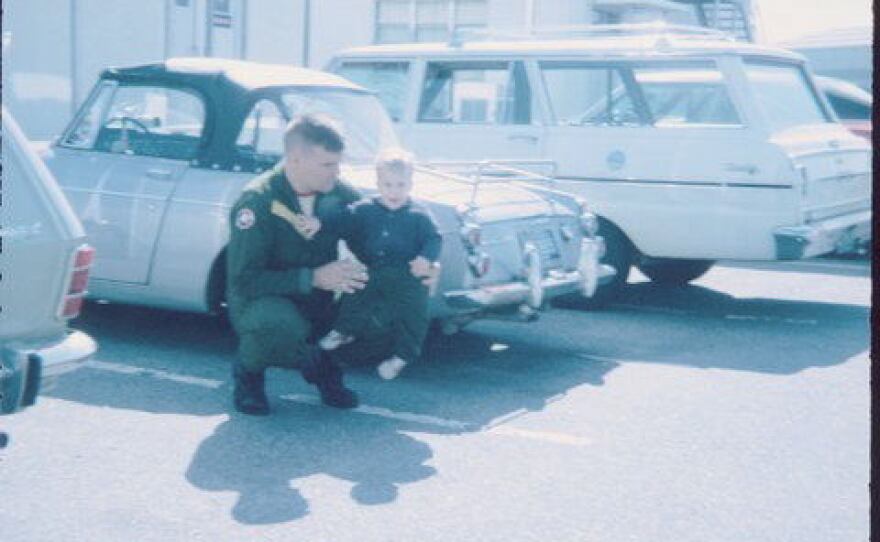It has been more than four decades since Elaine Zimmer Davis got the knock on her door that no Marine wife wants to hear.
“And I didn’t want to open it because I knew, I knew what was coming,” she said.
Her husband’s F4 Phantom plane had been shot down over a remote mountainside in Vietnam on Aug. 29, 1969. Witnesses described a fiery crash. Capt. Jerry Zimmer, a 25-year-old pilot, was “killed in action, no body recovered,” she was told.
“Later, members of his squadron came to see me,” she said. “They said, ‘Elaine, we could have put him MIA. We didn’t want you to be waiting years for him to come back when he wasn’t going to come back.'”
Jerry Zimmer was later reclassified to MIA: missing in action. Elaine said she spent years wondering if he might still be alive.
“I thought, ‘He’s out there,’” she said. “But inside, I think there was sort of that push-pull feeling that he couldn’t have survived the crash."
Jerry Zimmer’s unknown fate is shared with more than 1,600 other Vietnam service members who remain unaccounted for. After the war ended, the U.S. government set up a command to investigate MIA cases. Since then, the remains of nearly 900 service members have been recovered, according to the National League of POW/MIA Families.
Jerry’s case, though, remained unsolved and stamped “no further pursuit.”
But for Elaine, back in the states, life went on as she raised the couple's son, Craig, who was 2 when his father was shot down. They moved across the country from Rhode Island to Tustin in Orange County. That's where she met Ron Davis, a Marine helicopter pilot just back from Vietnam.
“We met sort of accidentally, and within the next year we were married,” Elaine said.
Over the years she had another son, Brett. She also completed college and enjoyed being a wife and a stay-at-home mom. The family eventually settled in San Diego.
But Elaine said a part of her remained unsettled, with no closure in the loss of her husband, Jerry.
After accompanying Ron on a business trip to Vietnam in 2004, she began a quest to find Jerry's remains.
“Maybe if I can bring home his remains, no matter when, I can feel like I did something for him,” Elaine said.
Researching and writing about the case became her full-time job.
The family delved into their own investigation, taking multiple trips to Vietnam to search for crash-site evidence and interview the locals. They trudged through rough terrain and layers of bureaucracy.
“We needed to convince the government that we had new evidence,” said Ron Davis, a former FBI agent. “That they should, in fact, reopen the case."
Ron created a three dimensional map of the crash site and put together a thorough report of the family's efforts. Finding Jerry is important to him.
“I’m a Marine and he’s a Marine, and just from the pure brotherhood of Marines, I’m very pleased to be assisting in that effort,” he said. "But also for Elaine. I know it’s very important for her."

Elaine said the U.S. government reopened Jerry's case and another excavation of the crash site is planned. Results could be complete this year.
“Right now, there is a small portion that they have nailed down as where remains and …perhaps with his body in portions of the aircraft, where they slid down the mountain," Elaine said.
Mountaineers will be required to search the 80-degree cliff. If remains are found, they will be sent to the Air Force for review and analysis, she said.
“I think having his remains come back and he’s here, I think that would do a lot for our family,” said Jerry’s son, Craig, now 47.

Craig said his mom’s search for closure has been an opening for him to learn more about his father.
“My mom pulled out this chest of letters, of mementos of all kinds of things that were 40 years in the past,” he said. “And the thing that was the most awe-inspiring was she had these tapes.”
The audio recordings are of his dad talking to him from Vietnam:
“So, it’s Daddy telling you goodbye for now, Craigy. And just behave yourself, and I’ll be seeing you pretty soon, Craigy."
Craig said his father is a hard person to live up to.
“He was a farmer, small town. He got into an Ivy League university. He became a naval aviator with the Marine Corps, he was a father, a husband, a son," Craig said. "He’s somebody that I hold in a high regard, and I think it’s a big part of who I am and who I try to be with my children as well."
Forty years after the Vietnam War concluded on April 30, 1975, Elaine said it may finally end for her.
“Maybe now he’ll come home,” she said, wiping away tears.
Jerry’s remains, if found, will be buried at Arlington National Cemetery.













